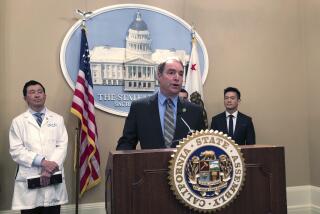Obamacare could help millions of American smokers to kick the habit

- Share via
Did you know that the Affordable Care Act may be the single most important anti-smoking initiative in the country?
Of course not. That’s because Obamacare’s supposed friends, the Democrats, have been too craven to talk about its benefits, while its enemies, the Republicans, want only to depict it as a “disaster” without addressing its many provisions.
But the New England Journal of Medicine in its latest issue sets the record straight. The authors, from the Centers for Disease Control and Prevention and the University of Wisconsin, point out that the poor uptake of smoking cessation programs has much to do with their expense and the only spotty coverage by health insurance plans. They say the ACA makes this coverage mandatory, without co-pays, cost-sharing or the requirement that doctors get prior authorization from insurers before prescribing. (See accompanying graphic.)
The anti-smoking initiative is just one of many provisions of the ACA that are little-known but likely to have a significant impact on Americans’ health. That underscores the fatuousness of much of the anti-Obamacare campaign. When Senate Majority Leader Mitch McConnell (R-Ky.) expresses glee at the prospect that the Supreme Court may yet “take down” the law because he doesn’t like anything that has President Obama’s name on it, these are the babies he’s willing to throw out with the bathwater.
Under the ACA, the NEJM authors write, smoking cessation must be treated as one of the preventive services that private health plans are required to cover without cost-sharing or prior authorization.
The evidence shows that this provision works. In Massachusetts, which added a smoking-cessation benefit to its Medicaid program in 2006, it reduced the smoking rate among the program’s enrollees to 28% from 38%, contributed to a drop in hospitalizations for heart attacks of almost half and produced an estimated $3.12 in savings for every dollar spent.
Federal guidelines call for coverage of at least two attempts to quit per year, including “individual, group, and telephone counseling” and all anti-smoking medications with FDA approval. There are currently seven on the list, including nicotine patches, gum and pills. “This guidance should substantially increase tobacco users’ access to proven cessation treatments that could help thousands of smokers quit,” they write.
Maybe more than thousands: The CDC estimates that about 42 million Americans, or 18% of all adults, are smokers. The highest rate belongs, as it happens, to McConnell’s home state of Kentucky, at 28.3%.
The ACA takes special aim at the Medicaid population. That’s wise, because smoking in the U.S. is especially prevalent among lower-income groups. The law makes no-fee smoking cessation programs and medications a part of Medicaid for new enrollees in those states that have accepted Medicaid expansion, prohibits states from excluding smoking medications from traditional Medicaid and requires smoking cessation coverage for pregnant women in traditional Medicaid. That’s key, because 20% of pregnant women on Medicaid use tobacco, according to a 2012 study by researchers from UC Berkeley and UC San Diego.
The impact of one other smoking-related ACA provision is less clear. That’s the rule allowing insurers to charge up to 50% higher premiums for smokers, depending on state approval -- making tobacco use the only pre-existing health condition subject to higher rates. The law requires the surcharge to be waived for anyone enrolled in an anti-smoking program.
The NEJM researchers worry that the hgher rates might have the unintended consequences of prompting smokers “to conceal their tobacco use, avoid seeking cessation assistance, or forgo health insurance altogether.” Their fears evidently are shared by officials in the District of Columbia and six states, including California and New York, which outlawed the tobacco-use surcharge.
The key to exploiting the ACA’s anti-smoking provisions is outreach, so that “both smokers and physicians are aware of the opportunities the law affords.” The Massachusetts program relied on intensive publicity, including radio and transit advertising and targeted mailings. Democrats who failed to stand up for the ACA during their election campaigns should be ashamed at missing out on the opportunity to improve their voters’ health. As the NEJM authors write, “If the ACA’s tobacco-cessation provisions are fully implemented, they could turn out to be one of its greatest legacies.”
Keep up to date with the Economy Hub. Follow @hiltzikm on Twitter, see our Facebook page, or email mhiltzik@latimes.com.
More to Read
Inside the business of entertainment
The Wide Shot brings you news, analysis and insights on everything from streaming wars to production — and what it all means for the future.
You may occasionally receive promotional content from the Los Angeles Times.











